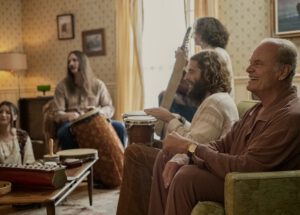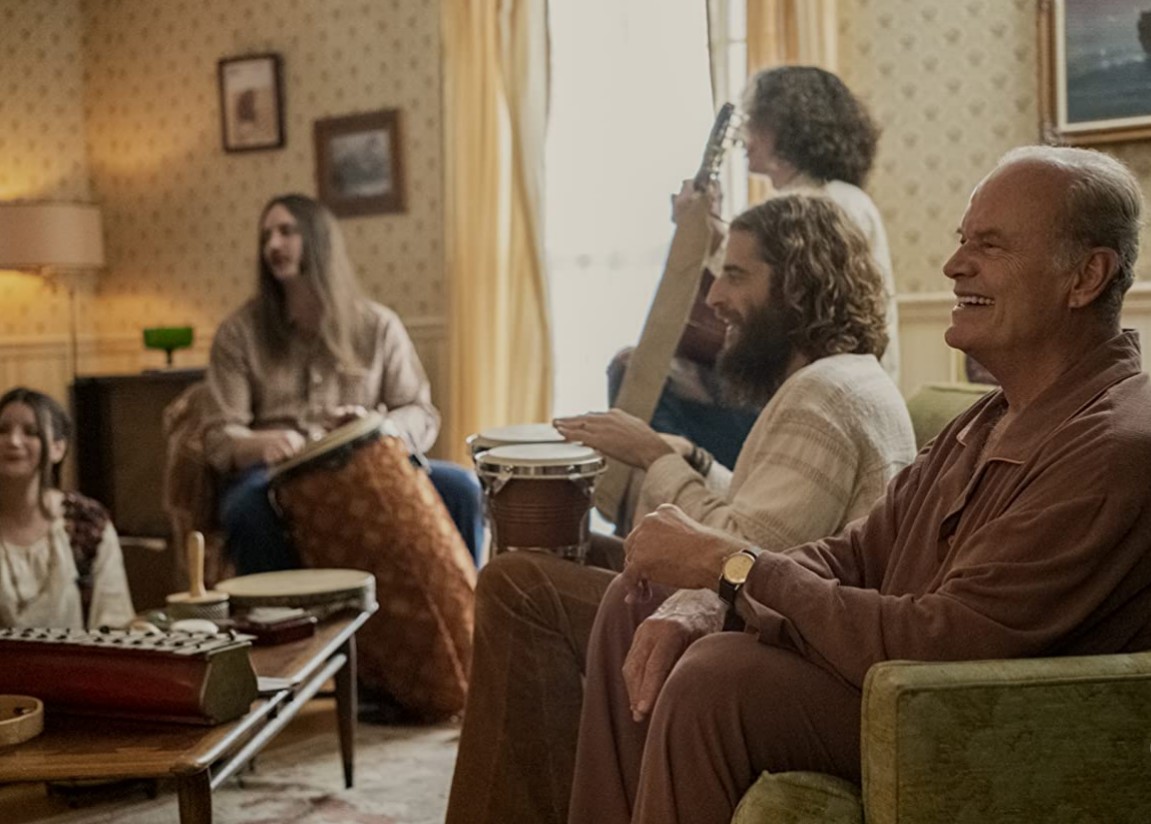Movie Info
Movie Info
- Director
- Jon Erwin and Brent McCorkle
- Run Time
- 2 hours
- Rating
- PG-13
VP Content Ratings
- Violence
- 1/10
- Language
- 1/10
- Sex & Nudity
- 1/10
- Star Rating
Relevant Quotes
You shall not take vengeance or bear a grudge against any of your people, but you shall love your neighbor as yourself: I am the Lord.
We know love by this, that he laid down his life for us—and we ought to lay down our lives for the brothers and sisters.

The U.S. has experienced many religious awakenings, dating back to colonial times and Jonathan Edwards, but probably awakening was as bizarre as the more recent one featured in Jon Erwin and Brent McCorkle’s new film, Jesus Revolution. Emerging from the Hippy Revolution with its slogan, “Turn on, tune in, drop out,” many youth, disillusioned by Timothy Leary’s drug culture, turned to Jesus for meaning and purpose in life. Their “Jesus Movement” became so large and influential that TIME Magazine dispatched a reporter to cover the movement, his work resulting in the June 21, 1971 cover story in TIME Magazine titled “The Jesus Revolution.” In this film the reporter, given the fictional name of Josiah (DeVon Franklin), shows up at numerous events and interacts with several of the protagonists.
This film could be billed as the story behind the TIMES cover, though the screenplay by co-director Jon Erwin (with Brent McCorkle) and Jon Gunnis, is based on the book by Pastor Greg Laurie who is one of the main characters in the film. In 1968 fatherless teenager Greg Laurie (Joel Courtney) lives with his alcoholic mother in a trailer in Newport Beach California. He drops out of the military academy that he hates in his quest for freedom and meets fellow teenager Cathe (Anna Grace Barlow). They join hippies enthralled by Timothy Leary and his promise of liberation through drugs, but drop out of it, eventually winding up at Calvary Chapel where Pastor Chuck Smith (Kelsey Grammer) is welcoming the flower children, despite the disapproval of older members who believe they should call the shots because they are the chief financial contributors
Pastor Smith has gone through his own spiritual revolution, thanks to his daughter who has challenged his staid, spiritless preaching. (In some ways this takes me back to the 1984 and 2011 films Footloose in which a pastor and his daughter are at odds over teenagers dancing!) There are just a dozen or so worshipers attending the Sunday service, all of them old enough for Social Security. Thus Calvary was a dying congregation when daughter Janette (Ally Ioannides) invited into her home two hitchhikers, San Francisco street preacher Lonnie Frisbee (Jonathan Roumie) and his wife Connie (Charlie Morgan Patton). The bearded Lonnie, looks like he’s stepped out of Godspell, preaching and living the gospel of love, even to the extent of going barefoot most of the time.
Although at first Smith wants to throw Lonnie out, the young man’s knowledge of the Bible and sincere joy melt the pastor’s icy resistance, and he invites him to church the following Sunday. Lonnie, in turn, invites enough followers to fill several pews—most of them like him, barefooted and dressed in bright-colored Good Will clothing. Amusingly, the hand full of regulars are seated on one side of the sanctuary, and the “hippies” on the other. While the old-timers glare at the newcomers, the hippies smile back. When invited to speak, Lonnie speaks of Jesus and love and the need for doors to be open for people who are different to walk through. Only Pastor Smith and his daughter are convinced that first Sunday, but with each passing Sunday more strangely clad youth show up, including Cathe, and then through her, Greg.
One of the great scenes of the film follows the objections of one of the old guard to the newcomers’ bare, and dirty, feet, that they will ruin the church’s shag carpet*. Right after this we see on the next Sunday a long line of youth patiently waiting—and there is Pastor Smith on his knees washing the feet of the worshipers, no doubt intentionally echoing Jesus’ act of servitude in John 13, as well as a rebuke to the hard hearted church officer.
Calvary Chapel’s attendance outgrows the sanctuary, so they set up a huge tent on the grounds. Hundreds attend the baptisms in the Pacific Ocean, one of those being Greg who takes on an active role in the church.
Greg’s baptism is beautifully symbolized cinematically when he is depicted as sinking into deep water, his old self put to death by drowning. This would be a good clip to use in teaching/discussing the apostle Paul’s concept of baptism in Romans 6:4, as we see Greg’s body sinking into the depths. (I have always deferred to Baptists in the argument of which form of baptism is best, sprinkling or immersion, and was glad when my Presbyterian denomination made both forms acceptable.)
Greg is led to reassess his relationship with his alcoholic mother Charlene (Kimberly Williams-Paisley). Lonnie starts singling out sick people and is led to heal them. He quotes from Acts 2:17, which itself is a quotation from the prophet Joel, to justify what he believes is the action of the Holy Spirit through himself. In one scene as he touches fervent young persons they fall into a trance, sinking to the floor. As this continues Pastor Smith and Greg become concerned that this is too theatrical. With so much attention centered on Lonnie, they apparently fear their movement is in danger of becoming a cult, so there is a parting of the ways. Lonnie moved to Florida where he continued his ministry that focused on the Holy Spirit and its work in the church. By the end of the film Calvary Chapel has developed a thriving movement with a thousand churches in its network and a radio program that reaches millions. Photos of the real-life persons are shown along with end notes, among which is the information that Pastor Chuck and Greg reconciled with Lonnie later in their lives. Pastor Smith died of lung cancer in 2013, and Lonnie Frisbee contacted AIDS and died in 1993.
Although I thoroughly enjoyed the film, I have come to have mixed feelings about it. Partly, this was due to my understanding that the characters probably interpreted the Bible literally, and so were spiritually the ancestors of the many megachurch pastors of today who preach Christian nationalism and support a failed politician and his big lie about the 2020 national election. My unease about the film grew even greater once I started researching the background of the chief characters—you can too by Googling their names, resulting in lots of hits, including Wikipedia articles about the characters.
Jesus Revolution, though inspiring, does not show how Pastor Smith’s literalistic interpretation of the Scriptures misled him to predict that the world would end with the Apocalypse in 1981. He continually preached this, and when it did not happen in 1981, moved it to a later date—and then, later on, denied to a telephone caller that he had ever done so. Nor does the film deal with the controversy of his church’s overlooking complaints that some of its leaders were guilty of sexual abuse. Furthermore, lest we think that his embrace of hippies shows his love as being unconditional, we should be aware of his harsh denunciation of homosexuals. Although claiming to hate the sin and not the sinners, he is reported to have railed against gay churches in one sermon that if he “flew a jet bomber, those churches would be the first targets of his deserved wrath.” His congregation is noted for its many of its members showing up at gay pride parades and such to denounce the gay life style.
Likewise, the film’s depiction of Lonnie Frisbee leaves out his activities among homosexuals. He never gave up the negative view of homosexuals held by the majority of fundamentalist Christians, and yet he would party with them on Saturday nights and show up on Sundays sometimes denouncing the lifestyle—truly a conflicted man. You can imagine what his enemies must have thought and said when he came down with AIDS and died.
And so, although this film provides an entertaining look at the background of TIME Magazine’s iconic cover story, I urge you to go deeper into the story. The Jesus Revolution no doubt was influential in our nation’s—and church’s—history, but whether the results—the present state of the evangelical church—are positive or not is open to debate. As a liberal Christian I want to affirm, as this film does, the good points of fundamentalist Christianity, but I can in no way ignore the harm that a literalist view of the Bible has done and is doing to our country. Kelsey Grammer wonderfully conveys the listlessness of Pastor Chuck Smith and his transformation into a compassionate pastor as Lonnie Frisbee influences him. I wonder how the actor would handle lines dealing with the end of the world or God punishing gays with death because of their lifestyle, had the filmmakers decided to tell the full story?
*I not only laughed at this objection, but was transported back to my seminary days when I was an intern at Chicago’s venerable Second Presbyterian Church, engaged in a student ministry. Right across the street was a college swarming with students who spilled out onto the street between classes because the building had no study hall. Our church, poor in attendance but rich in money and empty rooms, could, I suggested to the pastor, open its doors during the week and welcome in the students. He reported back to me that the trustees/elders turned the plan down—not because of the daunting task of finding volunteers to staff such a program, but because the student traffic would harm the church’s nice carpets!
For more on Pastor Chuck Smith see THE 5 CRAZIEST THINGS CHUCK SMITH OF CALVARY CHAPEL EVER SAID. And, as I suggest in the review, Google the names of the main characters to gain access to pro and con articles about them.
Lionsgate
This review will be in the March issue of VP along with a set of questions for reflection and/or discussion. If you have found reviews on this site helpful, please consider purchasing a subscription or individual issue in The Store.

